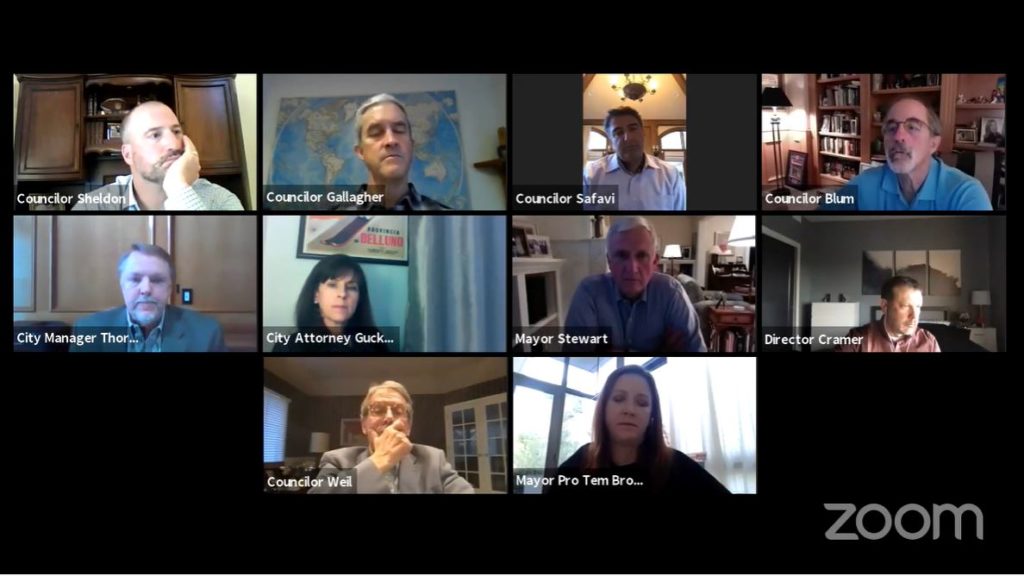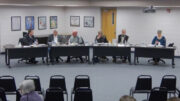By Jeffrey A. Roberts
CFOIC Executive Director
The Denver-based nonprofit that provides video access to the Colorado General Assembly is offering its virtual-meeting software package to local governments for free during the coronavirus pandemic.
“For now, at least 90 days while we’re dealing with COVID, there’s no charge for our service and we’re also covering the cost of their Zoom account, said Tony Shawcross, founder and executive director of the Open Media Foundation. “It’s part of our mission.”

Public bodies throughout Colorado and the nation have turned to technology to continue holding meetings while avoiding or limiting in-person gatherings that could expose their members and communities to the virus. The adjustment to virtual meetings has been awkward for some of the most tech-savvy governments, with some having a harder time than others.
Westword called last week’s meeting of the Denver City Council “a tech disaster.” At the start of the meeting, people watching on Channel 8 couldn’t hear the seven members who were physically present in the council chambers. After the meeting was restarted, the six councilors participating online were cut off from the rest of the council.
In some other parts of the country, virtual council meetings have been interrupted by “Zoom bombers,” internet trolls who look for opportunities to cause chaos.
Governments are using various tools to conduct virtual meetings. The Open Media Foundation combines Zoom, YouTube and its own Open.Media software to livestream meetings, which are then archived with searchable transcriptions and time-stamped agendas. As many as 500 people can participate in a meeting, and an unlimited number of people can watch the proceedings online.
The Open Media Foundation, which for the past few years has been giving away its video-archiving software to small local governments, helped the Lakewood and Cherry Hills Village city councils conduct their first-ever virtual meetings. Both meetings happened with few technical glitches, although one Lakewood councilor expressed concern that public input wasn’t taken during his council’s proceeding; instead, residents were asked to submit written comments ahead of time.
Worried about Zoom bombers, Cherry Hills Village instructed residents to email the city if they wished to comment during the council’s April 7 virtual meeting so they could be sent instructions on how to do so. The city also decided not to mention Zoom on the agenda and meeting notice – residents were just encouraged to watch the livestream on the city’s website – “because we heard that Zoom bombers find their victims by doing a massive word search for Zoom,” City Clerk Laura Gillespie told the Colorado Freedom of Information Coalition.
“We just wanted to keep it more specific to people who didn’t have that intention,” she said.
The Open Media Foundation itself was the target of a Zoom bomber in March during a webinar for municipal governments. John Aden, project manager for Open.Media, said everyone is quickly learning that “if you make the link to join the meeting public, you may have people joining who don’t have much that’s positive to contribute.” He also recommends using Zoom’s Waiting Room feature, which allows the host to control when participants join the meeting.
“There are challenges for sure. It just needs to be thought out,” Aden said of allowing public comment during virtual council meetings. “There needs to be a system for bringing people into the meeting when it’s their time to participate.”
Public comment isn’t required by the Colorado Open Meetings Law, aka the Sunshine Law, but most local governments set aside a period during meetings for residents to talk about issues. The Sunshine Law does require any electronic or telephone meetings conducted by a public body to be open to the public and held only after “full and timely” notice if a majority or quorum is expected to attend.
In late March, the office of Colorado Attorney General Phil Weiser issued guidance for public bodies on how to meet during the COVID-19 crisis. The memo addresses various issues, including public comment and best practices for holding closed-door executive sessions during an electronic meeting.
Using a conferencing system like Zoom, it says, allows for the creation of “side-bar meetings into which selected participants may join the portion of the meeting that has been closed to the public. This will allow for the public meeting portion of the electronic meeting to remain open while the executive session is conducted.
“Otherwise, in the absence of a commercial video-conferencing system, the safest way to conduct a closed executive session during a body’s meeting is by having a two-mode method for accessing the electronic meeting. That is, if the meeting is conducted by both webinar and a concurrent telephone dial-in conference bridge, the webinar portion of the meeting can be suspended or recessed while the executive session is conducted by telephone. Once the executive session is completed, the body’s board members would then rejoin the webinar video conference.”
The Open Media Foundation’s offer is for new government clients. After the pandemic, Shawcross said, governments serving populations of less than 50,000 will receive a full or partial grant to continue using the nonprofit’s video streaming and archiving service.
Follow the Colorado Freedom of Information Coalition on Twitter @CoFOIC. Like CFOIC’s Facebook page. Do you appreciate the information and resources provided by CFOIC? Please consider making a tax-deductible donation.




